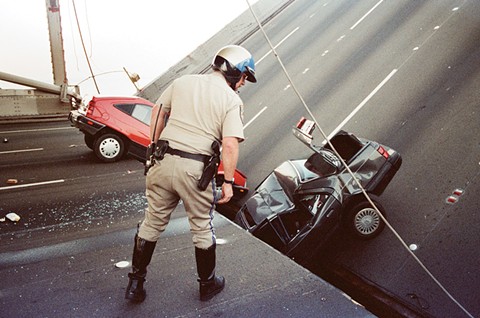On the day of the earthquake, I was doing freelance production work at home. Marina was eight months old and was socializing at Miss Bea’s daycare that afternoon. Steve and I were on the phone when it struck, me in the Mission and him on the fifth floor of a brick warehouse built before the 1906 earthquake.
For some reason, I react to earthquakes by laughing. Maybe it’s because that’s what people around me were doing during the first earthquake I experienced. It happened in 1973 in Mexico City while I was in a photography studio having a headshot done for a fotonovela. My friend Guillermo had a friend who worked at Rutas del Amor, and he thought I had “the look” for it. Being a big fan of the fotonovela, I was thrilled at the prospect of being in one.
The chair I was sitting on moved. When I looked down and saw nothing to explain it, I wondered if the sensation meant I was about to faint. Then everyone started laughing riotously and running out into the street. It made no sense that they reacted that way— earthquakes were not uncommon in the Mexican capital. I doubt running into the street was considered prudent earthquake behavior. Maybe it was kind of a Day of the Dead sentiment—a celebration of the fact that you hadn’t died yet, but today offered a fresh chance.
So when the Loma Prieta Earthquake struck while I was on the phone with Steve, I simply laughed and said, “Oh, it’s another earthquake. I’ll call you back when it’s over.” As soon as I put down the receiver, bricks started shooting out of the fireplace across the room. I ran into the hallway and braced myself in the designated earthquake spot of our railroad flat near Dolores Park.
As I sheltered in the hallway, it felt like a giant hand had picked up the building and was shaking it. Crashing sounds came from all sides. This was different than any earthquake I’d felt before, and in the years since I’d moved to San Francisco, there had been quite a few. The shaking lasted long enough for me to wonder if it might not be better to run out into the street, laughing or not.
Finally, the movement stopped. I raced back to the front room and was immediately confronted with evidence of the damage. Deep grooves in the hardwood floor showed the path the bricks had taken as they flew across the room. When I picked up the receiver the line was dead. I looked out the window and saw that the traffic light in front of the Go-Getters Market had stopped working. My first thought was Marina—I had to go get her right away! Miss Bea’s place on Shotwell might have been hit harder than ours. I grabbed the car keys and raced down the stairs of our second story flat.
A lot of the crashing sounds must have come from the stairwell, which had been lined with marble in a more opulent era. Several of the huge slabs had fallen from the walls and broken. One chunk of marble, about three by five, leaned against the front door. I tried to move the slab so that I could get out, but it was much too heavy.
Steve couldn’t be reached. I didn’t know when he’d make it home—“if” was a possibility I wouldn’t allow myself to consider. Marina’s safety depended solely on me. With a mighty effort, I managed to wedge one foot under the broken slab. As I used my foot as a lever, pivoting and wrenching the slab with both hands, it finally yielded.
That evening, with all of us safely home, we first learned details of what had happened in the rest of the city. A brick building had collapsed, killing five people. It was on Bluxome Street, just two blocks from the brick warehouse where Steve had his silkscreening business.
He was a reggae fanatic and had named his T-shirt printing business Babylon Burning from song lyrics. Massive fires raged in the Marina District, but Babylon was not Burning.
“You know, the South End Warehouse was built as a liquor warehouse. Turn of the century. The walls were built eighteen inches thick in order to keep the liquor cool.”
No, I hadn’t known that. But it was a relief to hear it.
There were some cuts and bruises on the top of my foot, but other than that we had come out of the earthquake unscathed. As we cleaned up the damage, I tried to lift the slab of marble at the bottom of the stairs again. It wouldn’t budge.
The maternal instinct had given me superhuman strength. [e1]
The earth beneath us remained relatively stable for years after the Loma Prieta earthquake. In 1994, we decided to visit Steve’s mother in Balboa Island and spend a day in Disneyland.
Barbara Patton lived in a tiny beach cottage, and the guest bedroom was barely large enough for a bed. We piled blankets on the rug at the foot of the bed for Marina; at five, she could sleep anywhere. Just before dawn on the day of our Disneyland trip, we were awakened by an all-too-familiar rolling and shaking. In one motion and without thinking, I launched myself from the bed to cover Marina with my body.
The maternal instinct must be operated by the autonomic nervous system. Marina was still asleep when the earth stopped shaking.

